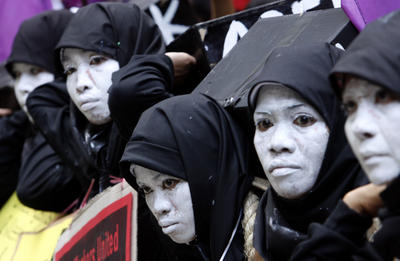Foreign domestic helpers are required by law to work and live in their employers’ homes. According to a 2013 report by Amnesty International, Indonesian maids, who account for half of the foreign domestic helpers in Hong Kong, work an average of 17 hours a day. Many do not even receive the Minimum Allowable Wage of HK$4010 (US$517) per month. Privacy is a luxury for helpers because of the limited living space and high property prices in Hong Kong. Some domestic workers sleep in kitchens, closets, bathrooms or hallways.
Exploitation by employment agencies make matters worse. For example, new maids coming to Hong Kong from Indonesia have to pay their home agencies HK$15,550 in government-stipulated fees, and very often another HK$5000–HK$20,000 to agencies in Hong Kong, although the latter sum is supposed to make up no more than one-tenth of the monthly minimum wage. These hefty fees put many foreign domestic workers in debt to the tune of several months’ salary. Workers are sometimes even willing to endure mistreatment by employers because of this debt. If they are sacked, they have two short weeks to find another job, after which they must leave Hong Kong.
The tough life of foreign domestic workers is all the more remarkable in light of their significant contributions to the city. Since the early 1980s, foreign domestic workers have helped to support Hong Kong’s booming economy in manufacturing and services. And across the decades foreign domestic workers have made an incalculable contribution to Hong Kong’s economy by enabling more married women to enter paid work. Between 1986 and 2011, the labour force participation rate of married women increased from 39.1 to 46.8 per cent. By contrast, the participation rate of unmarried women and men dropped over the same period.
The support provided by foreign domestic helpers has not only benefited the rich but also middle-class families. This is due to their relatively low wages. The minimum wage for a local helper (at HK$5760–6240 a month, based on a 48-hour workweek) is much higher than that for a foreign helper. More than 12 per cent of households in Hong Kong currently employ a maid. This is not the case in other developed countries where domestic workers are common only amongst rich families.
To some extent, foreign domestic helpers are an integral part of Hong Kong. By taking on childcare and aged care duties, they make up for the scarcity of government-provided services and facilities. This is especially important as Hong Kong is an ageing society popular with dual-income nuclear families.
There are continuous calls for better protection of foreign domestic workers in Hong Kong, many of which focus on abolishing the live-in rule, and on extending the two-week period that sacked helpers have to find new work. The Hong Kong government has so far only promised to step up surveillance of local employment agencies. Yet more measures must be taken to alleviate the plight of the foreign domestic helpers, and to address their legitimate concerns.
Foreign maids should be better educated about their legal rights and occupational safety and health standards through courses provided by the government. At the industry level, a self-regulatory body should be set up to help protect vulnerable workers. The government should also offer legal channels for foreign domestic helpers to report complaints and seek help. Finally, more respect and sympathy are essential to ensuring a better life for domestic helpers, who are making valuable contributions to Hong Kong society, while living far away from their own homes and children.
Zhuoni Zhang is an Assistant Professor at the Department of Applied Social Studies at the City University of Hong Kong.


A very nice article that brings hope of an improvement in certain abuses within Hong Kong. Respect among neighboring countries and their citizens is very important to create a peaceful, harmonious and balanced environment in the region.